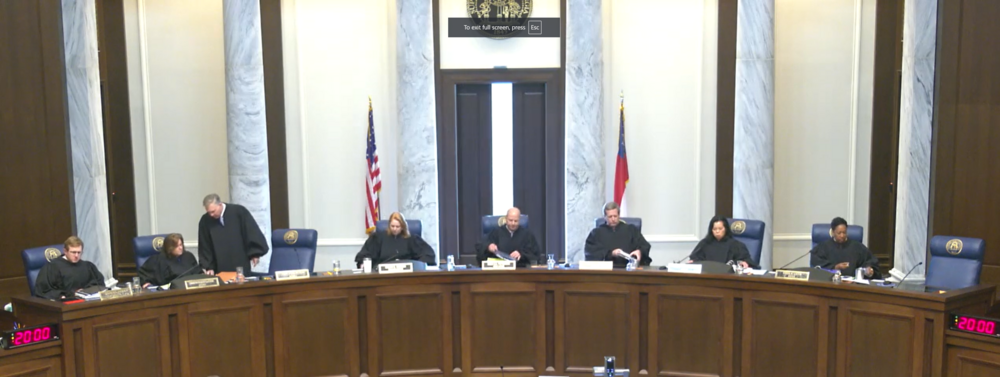
Caption
Georgia Supreme Court justices are seen May 13, 2025, via a livestream of oral arguments.
Credit: GA Supreme Court
LISTEN: The state Supreme Court heard arguments Tuesday on a case that could change the way landlords of public housing are held accountable. GPB's Sofi Gratas reports.

Georgia Supreme Court justices are seen May 13, 2025, via a livestream of oral arguments.
Arguments and questions presented Tuesday in the case of Guy v. Housing Authority of the City of Augusta were focused on one major point — do Georgia’s municipal housing authorities have the same protections as the municipality itself?
The protection in question is something called “sovereign immunity,” which dates back to British common law. The updated version of that precedent protects state and federal agencies, such as the post office or police departments, from some lawsuits today.
If Augusta’s housing authority is granted this protection, it could be immune from liability in cases where it's sued over negligence, and the case could be used as an example to protect public housing agencies in other lawsuits.
Guy v. Housing Authority was sent to the state supreme court after the Georgia Court of Appeals ruled that the Augusta housing authority is “acting as an instrumentality of the City” in its day-to-day operations, and should therefore be protected, a decision which plaintiff Christina Guy appealed.
On Tuesday, the attorney for the Augusta housing authority, Christopher Cosper, argued the agency deserves protection for its roles under the state government.
“If the King formed 10 men to go deliver a message or 100 men to build a bridge, they carried his immunity,” Cosper said, hearkening to the original concept of sovereign immunity. “And I can see no rational reason to draw a line of where that is.”
But on the other side of the argument, tenants of public housing could be left without a legal avenue.
In 2022, Augusta resident Guy sued the city housing authority after she was injured during a robbery. She alleges they hadn’t taken measures to keep the apartment complex safe.
At the time, Guy was living at the Dogwood Terrace apartments, a complex then operated by the housing authority — and which the authority has since decided to demolish.
"We made the determination that we didn't want to continue to sink money into modernizing and maintaining what's obviously obsolete property," housing authority director Doug Freeman said last October.
Existing tenants will be relocated.
An entrance to the Dogwood Terrace public housing complex in Augusta where in 2021, tenant Christina Guy was shot in the leg.
Attorneys from the Georgia Trial Lawyers Association (GTLA) out of Columbus and Atlanta argue in Guy's favor in an amicus brief filed into the case.
“Guy alleges that the Housing Authority failed to use ordinary care to furnish her a safe place to live, causing her injury,” they write. “But the Housing Authority moved to dismiss Guy’s case on the basis of sovereign immunity. It contends — and the Court of Appeals agreed — that the courthouse doors are closed to tenants harmed by a housing authority’s negligence.”
Guy's attorney, James Kyle Califf, said in a statement to GPB that they are hopeful the state Supreme Court will make the "right decision under the law."
"In my view, the lower courts were wrong to extend sovereign immunity to local housing authorities, because any expansion of sovereign immunity should require an act of the Legislature," Califf wrote in an email.
Meanwhile, housing authorities in Decatur, Macon and Columbus have issued their support for a judicial overhaul in an amicus brief filed into the case, where they argue that public housing agencies provide a vital public service — affordable housing — which "would be badly undermined" if not protected.
“Housing Authorities do not operate for profit (O.C.G.A. § 8-3-11), and their income sources are limited to rent and grants from state and federal agencies,” it reads.
If faced with more lawsuits, it continues, they would be limited in their ability to afford fighting in court, without reducing the number or quality of units they have available. The agencies also raise concerns about the cost of rising insurance premiums.
Georgia Supreme Court Chief Justice Nels Peterson on Tuesday called the case “challenging.”
“The question of who has sovereign immunity isn't necessarily answered by looking at an article of the Constitution,” Peterson said.
A decision from the justices on the “scope” of sovereign immunity could instead rely on their interpretation of common law, Peterson suggested.
Several other lawsuits where tenants allege harm from conditions in public housing, including some out of the same complex where Guy was injured, are on pause until the higher court reaches a decision, which could take months.